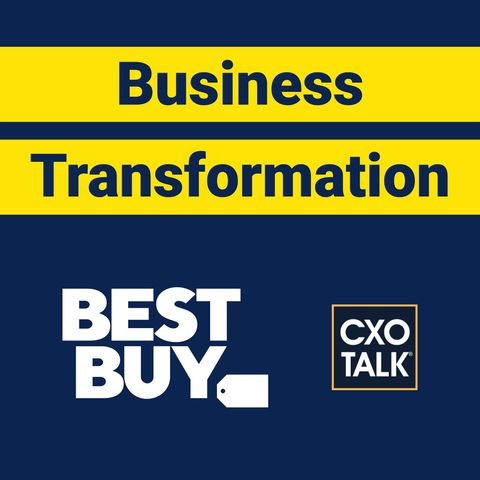Former Best Buy CEO: Purpose-Driven Business Transformation

Scarica e ascolta ovunque
Scarica i tuoi episodi preferiti e goditi l'ascolto, ovunque tu sia! Iscriviti o accedi ora per ascoltare offline.
Descrizione
#BusinessTransformation #DigitalTransformation How can a large organization apply purpose-driven principles to create meaningful business transformation? The former CEO of Best Buy, Hubert Joly, explains purpose-driven, digital business transformation by presenting...
mostra di piùHow can a large organization apply purpose-driven principles to create meaningful business transformation? The former CEO of Best Buy, Hubert Joly, explains purpose-driven, digital business transformation by presenting the Best Buy company strategy he created.
The discussion includes these topics:
-- About Hubert Joly's book: The Heart of Business
-- Why did Best Buy have trouble in 2012?
-- Driving efficiency with respect for people
-- What is purpose-driven transformation?
-- Efficiency vs. cultural transformation
-- Importance of customer experience at Best Buy
-- Customer experience and corporate culture
-- How do you balance staff and management?
=======
Watch the video and read the complete transcript:
https://www.cxotalk.com/episode/former-best-buy-ceo-purpose-driven-business-transformation
Subscribe to our newsletter to be notified of upcoming live shows: https://www.cxotalk.com/subscribe
=======
Hubert Joly is the author of THE HEART OF BUSINESS: Leadership Principles for the Next Era of Capitalism. He is the former Chairman and Chief Executive Officer of Best Buy and is now a senior lecturer at Harvard Business School. He is also a member of the board of directors of Johnson & Johnson and Ralph Lauren Corporation, a member of the International Advisory Board of HEC Paris, and a Trustee of the Minneapolis Institute of Art. Joly has been recognized as one of the top 100 CEOs in the world by the Harvard Business Review, one of the top 30 CEOs in the world by Barron’s and one of the top 10 CEOs in the U.S. by Glassdoor.
=======
From the conversation:
What is purpose-driven transformation?
Michael Krigsman: Let's talk about purpose for a moment. We do hear this term kind of popping up everywhere. I think very often it's a good, politically correct, motherhood and apple pie kind of, you know, it feels good, but there is no real substance. How do we convert that into something substantive and meaningful?
Hubert Joly: Yeah, so let me make it really concrete and share some of the lessons learned along the way. I'll tell you that it was challenging. This was not a walk in the park. As a result, we've learned a lot [laughter], frankly, during that time.
Back in 2016, as we were looking to accelerate our growth, we did the good work around market research, segmentation, targeting, positioning – what I teach my students at Harvard Business School in the marketing course. Then we also wanted to go beyond that and started to think about our why – maybe influenced by Simon Sinek – why do we exist?
That's where we came up with the concept, actually said it, "We are not a retailer. We are not a retailer. We are a company that's in the business of enriching lives through technology by addressing key human needs."
Defining your purpose, I think you find a company purpose at the intersection between four circles:
What the world needs. What are the human needs you're trying to address?
What you are uniquely good at.
What you are passionate about.
Then, of course, how you can make money.
This is real substantive. This is not philanthropy. This is not CSR or OESG. This is a business discussion.
The benefit of defining the business in terms of its purpose is that, number one, it vastly expands the addressable market. There are a couple of examples of that.
That's how, at Best Buy, we went into the healthcare space helping aging seniors live and stay in their home independently longer by placing sensors under their bed, under their sofa, in the kitchen, in the bathroom. Fall detection.
People who have aging parents know what I'm talking about. They live independently, but you want to keep an eye on them. With remote monitoring, artificial intelligence, and care centers, you can actually really be helpful. That's a service that's sold through insurance companies. We would never have thought about this if we had thought of it ourselves as a retailer.
The other example is something I hope everybody will take advantage of, which is the in-home advisor program where, if your need is complex, it's too complex to be handled in the store or online, we actually come to you. We'll aspire, if you let us, to become, over time, like your CIO, your CTO for your home. Our homes are becoming more and more complex, so that's a real need. Again, you would not have done that as a retailer.
The second thing it does, a noble purpose, it's inspiring for customers. In our hearts, as human beings, we have a desire profoundly to do good things to other people. It's the Golden Rule. We want to make a difference, a positive difference, in the world.
Now, again, if you just stay at the definition of the purpose, nothing happens. The two examples I've given you show how you can make it a cornerstone of your strategy and come up with specific initiatives that support that purpose.
Informazioni
| Autore | Michael Krigsman |
| Organizzazione | Michael Krigsman |
| Sito | - |
| Tag |
Copyright 2024 - Spreaker Inc. an iHeartMedia Company

Commenti